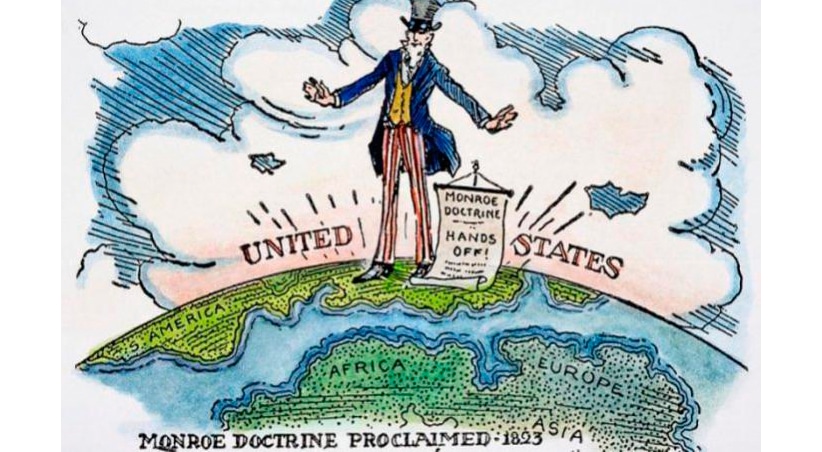On Monday, March 28, the Pentagon submitted its 2022 National Defense Strategy (NDS) to Congress. While the entire report remains classified, an unclassified fact sheet was released to the media. It identified the Pentagon’s four main defense priorities:
- Defending the homeland, paced to the growing multi-domain threat posed by the PRC.
- Deterring strategic attacks against the United States, Allies, and its partners.
- Deterring aggression, while being prepared to prevail in conflict when necessary, prioritizing the PRC challenge in the Indo-Pacific, then the Russia challenge in Europe.
- Building a resilient Joint Force and defense ecosystem.
The new NDS is the first since 2018, when General James Mattis declared, “inter-state strategic competition, not terrorism, is now the primary concern in U.S. national security.”
The 2018 NDS identified Washington’s four main competitors and split them into two categories: “revisionist powers” Russia and China, and “rogue regimes” Iran and North Korea. In its threat hierarchy, it placed Russia and China together at the top.
While the Pentagon’s 2022 strategy still names Russia an “acute” threat, it designates China as its “most consequential strategic competitor and [] pacing challenge.”
Although the Pentagon’s new grand strategy of “Great Power Competition” was declared only four years ago, its hubris is already apparent: the United States does not have the means to dominate the world, nor does it know how to do so.
The issuance of the 2022 NDS itself exemplifies this folly.
It is customary for a publicly available, unclassified summary to accompany the release of the classified NDS that is submitted to Congress. In 2018, the unclassified summary tallied fourteen full pages.
The full 2022 strategy, however, was submitted to Congress without a publicly available summary. Instead, the Defense Department provided a paltry two-page fact sheet.
Foreign Policy, an establishment outlet with connections to congressional insiders and Defense Department officials, illuminated some of the reasons for the discrepancy. On Monday, March 28, its Pentagon and national security reporter, Jack Detsch, wrote:
The Biden administration is briefing lawmakers on the classified version of the National Defense Strategy today, four people familiar with the effort told Foreign Policy, in a bid to provide additional justification for the increased $773 billion defense allocation in the White House budget request, released Monday.
The Biden administration has delayed rolling out its national security and defense strategies, as the U.S. Defense Department makes last-minute tweaks amid the monthlong war between Russia and Ukraine, suddenly shifting focus from a U.S. defense strategy that had eyes on China.
The decision to widely brief lawmakers and staff on the changes is atypical; usually, it would accompany the release of a publicly available unclassified strategy. But officials and experts said the move is important to help Congress understand how the Pentagon would spend the sized-up budget request and how it is changing U.S. military policy with war engulfing Europe.
While the Russian invasion of Ukraine is a significant variable that has surely changed some strategic considerations, the State Department has, according to officials cited by Foreign Affairs, “seen Russia telegraphing the wider invasion of Ukraine for over a year.”
Even if the last minute alterations are just a cash grab, why didn’t the Defense Department prepare for this contingency, especially given the evidence of long established plans to train and equip a Ukrainian insurgency?
Although Foreign Policy later argues the changes to the NDS do not significantly detract from a focus on China, the urgent modifications have raised significant concerns about Washington’s ability to contain Russia and China in two main theaters.
These concerns are so widely held that they have caused debate between insiders, experts, and White House and Pentagon officials. Foreign Affairs continues:
White House and Pentagon officials have insisted that they can “walk and chew gum” when it comes to punishing Russia’s invasion of Ukraine while continuing to focus on China. But some experts and congressional officials are concerned that the ongoing crisis may limit the Pentagon’s ability to come to the aid of Asian allies under China’s threat. The United States already sent more than 6,000 U.S. troops to reinforce NATO’s eastern flank as well as F-35 fighter jets–and has had discussions about making some of those deployments permanent.
The Trump-era strategy effectively abandoned the idea of a U.S. military that could fight in two major regional wars simultaneously in favor of squarely putting the U.S. focus on a possible future conflict with China.
But some experts believe that the United States should resist the urge to leave Europe. “The temptation may be to argue that Russia’s difficulties in Ukraine show that a China, China, China focus remains appropriate, and that the United States will not need additional resources to shore up NATO in Europe. I think that is the wrong approach,” said Hal Brands, a professor of global affairs at Johns Hopkins University’s School of Advanced International Studies and the author of a recent book on the Cold War’s lessons for great-power rivalry…
The problem with Foreign Affairs’ take is that Trump never effectively abandoned the idea of a two-front war. Mattis’ 2018 NDS did not reflect this claim and neither did Trump’s policy.
A plain reading of Mattis’ 2018 NDS, coupled with Trump’s actual Russia policy, confirms that Washington has been confronting China and Russia on two fronts since at least 2016. The 11th hour alterations to the 2022 NDS are a de facto continuation of this policy.
And it’s only driving Russia and China together—in further opposition to the West.
On March 30, 2022, Russian Foreign Minister Sergei Lavorov met with his Chinese Counterpart, Wang Yi. At this historically significant meeting, the pair discussed the creation of a “New, Fair, Multipolar World Order” in the wake of the Ukraine Crisis. Their statements reflect continued Russia-China cooperation in the face of Russia’s economic blacklisting.
The Defense Department’s submission of the 2022 NDS is reminiscent of a safety marketing pitch cobbled together the morning after an executive’s DUI with the company car. Washington would demand even more money from struggling Americans to counter a war that it itself provoked and is purposely prolonging. All while it desires a pivot to the Indo-Pacific?
Washington is delusional if it believes it will ever depart from a policy of dual front containment–at least as long as it pursues “Great Power Competition.”
And for what?
Foreign Policy itself asserts that Putin has desired closer ties with NATO. Indeed, Putin has expressed this as recently as December 2019.
On March 23, Chinese Foreign Ministry Spokesperson Wang Wenbin was asked about the 2022 NDS. He said:
The above-mentioned U.S. national defense strategy report is full of Cold War and bloc confrontation mentality. China and Russia are two major countries. The U.S. attempt to contain and suppress them will not succeed. The U.S. should reflect on its due responsibilities in the Ukraine crisis, show repentance for and correct the practice of establishing imaginary enemies, ignoring other countries’ legitimate security concerns and stoking bloc confrontation. We urge the U.S. to earnestly implement its leadership’s statements that the U.S. does not seek a new Cold War with China; that it does not aim to change China’s system; that the revitalization of its alliances is not targeted at China; that it does not support “Taiwan independence”; and that it has no intention to seek a conflict with China. The U.S. should work with China to find the right way to get along with each other under the new circumstances featuring mutual respect, peaceful coexistence and win-win cooperation.
It is naive to think that China does not have its own interests and motivations at heart, but a belief that, absent American confrontation, China would emerge as the new world hegemon, is equally unrealistic. The United States should take Wenbin’s statement seriously.
It is past time to believe that the U.S. can continue to enforce its own singular world order, especially if its 2022 NDS is indicative of its ability to juggle two global fronts. Its attempts will surely fail.
The only question is how? Will its influence peter out like a candle? Collapse like a high-rise? Or will the Empire’s death throes commit us all to nuclear fire?
































